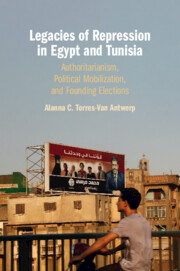 Legacies of Repression in Egypt and Tunisia
Legacies of Repression in Egypt and Tunisia Book contents
- Legacies of Repression in Egypt and Tunisia
- Legacies of Repression in Egypt and Tunisia
- Copyright page
- Dedication
- Contents
- Figures
- Tables
- Acknowledgments
- Introduction
- 1 Authoritarian Politics and Founding Elections
- Part I Members of the Club or the Only Game in Town?
- Part II Phoenix from the Ashes
- Part III Epilogue
- Appendix
- References
- Index
1 - Authoritarian Politics and Founding Elections
Published online by Cambridge University Press: 10 March 2022
- Legacies of Repression in Egypt and Tunisia
- Legacies of Repression in Egypt and Tunisia
- Copyright page
- Dedication
- Contents
- Figures
- Tables
- Acknowledgments
- Introduction
- 1 Authoritarian Politics and Founding Elections
- Part I Members of the Club or the Only Game in Town?
- Part II Phoenix from the Ashes
- Part III Epilogue
- Appendix
- References
- Index
Summary
Authoritarian regimes vary with respect to regime–opposition relations, along a continuum of more open to more closed, focusing on the degree of competition the regime permits during elections. The particular political opportunity structure facing any individual opposition group varies according to the strategies that the regime uses in dealing with that particular group: inclusion, co-optation, or exclusion. The microfoundations of both party formation and political mobilization do not operate in isolation or in the same way as they do in established democracies, but in fact interact with the effects of the political opportunity structure that existed during the prior authoritarian era. An examination of the common competing explanations for party formation and political mobilization show that, while each explanation arguably does play a role in shaping these outcomes, they are limited in their comparative utility and frequently fail to explain the actual variation observed in these cases. Instead, mechanisms link the structure of state–opposition relations and the political opportunity structure facing different groups to their relative decisions around party formation as well as to the tactics and effectiveness of political mobilization in founding elections. Finally, the common causes of opposition group dissolution interact with the opportunity structure of the authoritarian era.
Keywords
- Type
- Chapter
- Information
- Legacies of Repression in Egypt and TunisiaAuthoritarianism, Political Mobilization, and Founding Elections, pp. 20 - 52Publisher: Cambridge University PressPrint publication year: 2022


